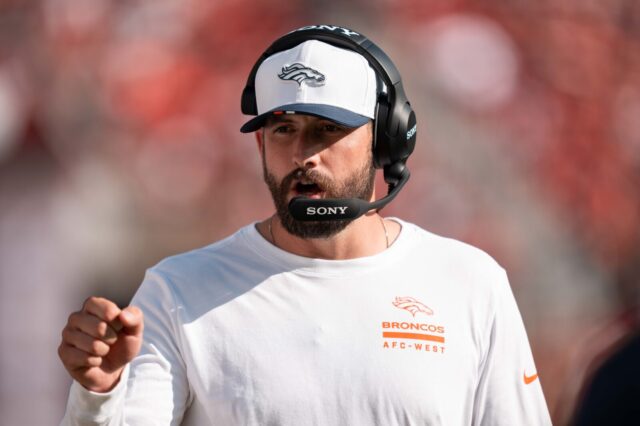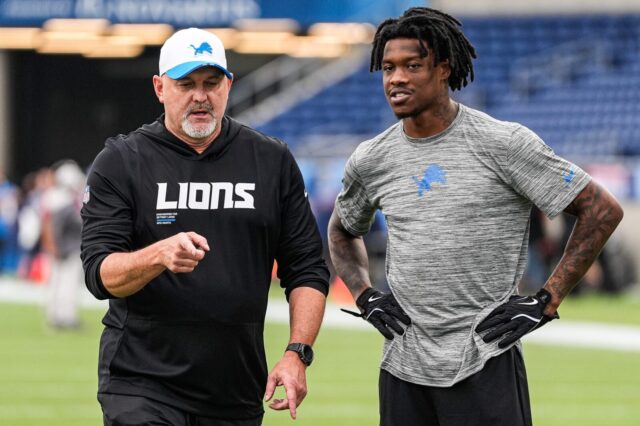This week at the NFL’s annual owners’ meetings in Arizona, teams will review and vote on 23 proposed changes to the league’s rulebook. Some of the tweaks are fairly subtle, like modifications to the replay system. Other suggestions are pretty groundbreaking, such as a bonus field goal for an additional point after a successful two-point conversion.
But in the end, very few of the proposed changes will pass. And those that do won’t be very revolutionary. The league, like most big businesses, tends to move incrementally; change happens very slowly.
At best, there will be some subtle adjustments that might cause a little confusion early in the 2015 season. The first time America gathers to watch RedZone in September, the announcers may have some minor explaining to do.
There are, however, some rule changes that would make a big difference on the sport. There are some things that would go far beyond being just a tweak, which would improve the game immensely.
They’d make it more competitive. They’d make it safer. And in the end, they’d make it more fun.
So with that in mind, here are 10 rule changes that the NFL should institute immediately:
***
10. Ban Kneeling at the End of the Game
At any other time during a game, a player isn’t down when his knee touches the ground; he has to be touched by a defender before the whistle blows. But for some reason, quarterbacks are allowed to kill time in the waning seconds of a game by simply taking a knee. Sometimes, this half-hearted play allows the team with the lead to burn two full minutes, thanks to the NFL’s 40-second play clock (which is another problematic change; late-game comebacks were more prevalent when it was 30 seconds). Instead, the league should make teams run an actual football play; it’d add some drama and lead to better finishes.
9. Eliminate the Lambeau Leap (and Similar Celebrations)
If the league is going to make it illegal for a player to dunk the basketball over the goalposts when they score a touchdown, which they did last year in what is unofficially known as “the Jimmy Graham rule,” then they should prohibit any post-score celebration, especially one that doesn’t take place on the playing field. It’s the height of hypocrisy that the NFL continually talks about reducing taunts and minimizing celebrations, but the Lambeau Leap remains okay in the league’s eyes. Not only that, but it’s a safety issue, as well; a player jumping into the stands has potential trouble written all over it.
8. Move to the College Form of Overtime
The NFL took one step forward when they tweaked the overtime rules a couple of years ago, ensuring that a team can’t win the game with a field goal on the opening drive of the extra period. But that didn’t go far enough, as there’s still an advantage to winning the coin toss and getting the ball first. Former Broncos head coach John Fox is trumpeting the Bears proposed rule change that each team gets to have the ball at least once, no matter what occurs on the opening drive; but that idea seems destined for failure, as the league worries about games going too long, with five quarters of play being a health risk. That’s why the league should look at another alternative, one that doesn’t put too much emphasis on heads or tails. The college game has it right, with each team getting an equal shot to claim victory in OT. The NFL should do something similar, but start each “drive” at midfield, making it imperative that a team get a first down or two before they are in field goal range.
7. Make Challenges Unlimited (if a Coach is Right)
As it stands now, an NFL coach can only challenge a maximum of three calls during a game, assuming they were right on the first two. If they go three for three on disputes with the officials, they are out of luck the rest of the game; they can’t protest any more calls. That’s just ridiculous. If the referees blow 20 calls in a game, a head coach should be able to challenge them all; it’s not his fault that he’s dealing with incompetent officials. Why limit his ability to ensure that things are done correctly? That seems to go against the very basis for replay in the first place, which is that there should be a remedy for missed calls. However, to avoid over-challenging, a coach should be done throwing the red flag once he’s proven to be incorrect about a call. Doesn’t that make a lot more sense?
6. Eliminate Penalties Resulting in Automatic First Downs
If an offense is facing third-and-18 and they draw the defense offsides, which is a five-yard penalty, the down-and-distance rightfully becomes third-and-13. Yet if a D gets flagged for a defensive holding penalty, which is also a five-yard infraction, it results in the O getting an automatic first down. How does that make any sense? It seems to be overly punishing the defense, which did a great job to put the offense in a tough spot in the first place; it’s negating two good plays with something that could be a ticky-tack call, bailing the offense out of a bad situation. If the yardage awarded by the penalty doesn’t move the ball far enough for a first down, then it shouldn’t be a first down; no more of this arbitrary “automatic” nonsense.
5. Make the Playoffs a 16-Team Bracket
College basketball is a dying sport that generates little national interest for most of the year, but the powers-that-be at the NCAA have figured out how to become the center of attention in March – brackets. Everyone loves to make their picks and track their progress. It doesn’t matter that they have no idea why they’re making their selections; it’s all about the process of trying to predict what’s going to happen. The NFL should allow sports fans to do the same during the league’s annual playoffs, seeding the top half of the league in a tournament-style playoff that has no regard for conference, division champs or anything other than a team’s overall record. Sixteen teams make the playoffs. Sixteen teams are left out. What’s not perfect about that formula?
4. Make Any Penalty Reviewable
If a referee throws a flag, it’s a signal that he or she saw an infraction occur on the field. If replay shows such a penalty didn’t happen, a coach should be able to protest the call. That seems like a no-brainer, whether it’s pass interference, holding or any other penalty. If everyone at home can see there wasn’t a penalty, and if the announcers watching the same replays that the officials would get to review are hooting and hollering about the error, the call should be able to be corrected. The league’s argument that “judgment calls” should be able to be overturned is silly; if the so-called judgment is bad, why not fix the mistake?
3. Adopt Arena League Goalpost Dimensions
There’s not much that is right about arena football, a hokey version of the game played on an undersized gridiron. But they did have one thing right: They made it tough to score points via kicking the ball. That’s a skill that isn’t particularly fun to watch; nobody pays big money to watch the kickers. So it needs to be made more interesting; nothing would accomplish that goal quite like making it more challenging to be successful. Arena football uprights are only nine feet wide (versus 18 feet, six inches in the NFL) and they are 15 feet above the ground (instead of 10 feet). This would put a premium on kicking accuracy, making even extra points an interesting play.
2. Eliminate Kickoffs
Far too often, the television networks go to a commercial break after a touchdown, come back for a kickoff that sails through the end zone for a touchback and then cut to another set of ads. In essence, this leads to six minutes of commercials between meaningful plays. From the time one team scores a touchdown until the other takes a snap on offense, there’s way too much time without anything happening. Why? Because more often than not, the kickoff is a mere formality, a play that results in no action. Plus, returns that do occur are the most-dangerous plays in the game; they feature 22 players running full speed at each other, setting up monster collisions. Just nix them altogether.
1. Make a Position Player Handle All Kicking Duties
It’s always been odd that a bunch of 300-pound men can battle in the trenches for 59 minutes and 59 seconds, only to see the outcome of their struggle determined by a 160-pound guy from Europe. Wouldn’t it make more sense if the player who punts, kicks field goals and handles extra-point duties was an actual player, not a specialist? That’d be fairer and far more interesting. And it wouldn’t be that difficult to manage. Whoever scores a touchdown has to kick the extra point; that game-tying kick would certainly be more interesting if Demaryius Thomas was lining up to toe it through the uprights. And a punt or field goal has to be attempted by someone who was on the field for the play before the kick; that changes strategies and personnel groups in a major way.
***
Will any of these changes be implemented? Not this year, if ever. But each and every one of them would make the nation’s most-popular sport even better. And that’s the best way for football to stay on top; the league needs to keep adapting, which is always the formula for staying No. 1.
Buck Stanton is a feature writer for cover32.com. He believes that emotion is for suckers and statistics never lie.



